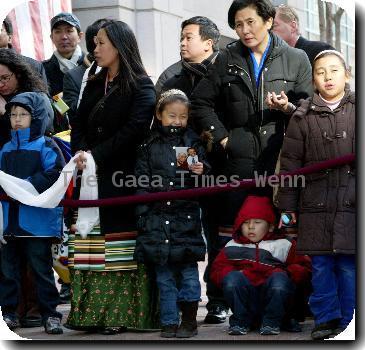Ukraine’s prime minister dares opponents to oust her before rival’s inauguration as president
By Yuras Karmanau, APThursday, February 25, 2010
Ukraine’s Tymoshenko to rivals: oust me if you can
KIEV, Ukraine — Viktor Yanukovych was set to be inaugurated as Ukraine’s president Thursday amid expectations that he will steer Ukraine back toward Russia’s orbit after the previous leadership struggled to build bridges to Europe.
But Yanukovych enters office with a shaky mandate, inheriting an economy crippled by the global financial crisis and a nation whose political loyalties are deeply divided.
He has broad support in the Russian-speaking east of the country, but in the Ukrainian-speaking west, he lost in virtually every region to Prime Minister Yulia Tymoshenko, the heroine of Ukraine’s pro-Western Orange Revolution of 2004.
He also faces a formidable enemy in Tymoshenko, who has fiercely opposed his presidency after losing to him by a narrow margin in the Feb. 7 runoff vote.
Her refusal to concede defeat and step down threatens to prolong the kind of political wrangling that has paralyzed Ukraine’s government for several years, deepening the financial crisis that shrank the economy by 15 percent last year. The parliament has not even been able to pass a budget for this year.
Weeks of negotiations in the back rooms of parliament have failed to produce a coalition against her. On the eve of Yanukovych’s inauguration, she appeared to taunt his Party of Regions for this failure, challenging its leadership to oust her if they could.
“The Party of Regions does not have the votes to carry out this dismissal,” Tymoshenko told a government meeting Wednesday, appearing in a stark red dress instead of the soft tones she is known for wearing.
The deputy head of Yanukovych’s party, Anna German, said Yanukovych would never be able to work in tandem with Tymoshenko and would seek to replace her by this spring.
“The coexistence of Yanukovych as president and Tymoshenko as prime minister is impossible,” German told The Associated Press on Wednesday. “By this spring, Ukraine will have a new premier who will think not about his own ambitions and of clinging to power, but about the country.”
In order for his party to form a majority coalition, Yanukovych will need to strike a deal with his former adversary, the outgoing President Viktor Yushchenko.
Yushchenko and Tymoshenko led mass street protests in 2004 against Yanukovych’s rigged election victory that year. Dubbed the Orange Revolution, those demonstrations urged the Supreme Court to overturn Yanukovych’s win and call for a revote, which Yushchenko won by a narrow margin in early 2005.
Tymoshenko became prime minister under Yushchenko, but their partnership broke down amid political maneuvering and recriminations that caused gridlock for much of Yushchenko’s time in office.
He did not make it past the first round of voting in January, and called on his supporters to vote “Against All” — an option in Ukrainian ballots — rather than support either Tymoshenko or Yanukovych in the second round.
Tymoshenko will likewise need to hold onto the support of Yushchenko’s party in parliament if the “Orange Coalition” is to survive.
Revealing the chamber’s current state of confusion, Speaker Volodymyr Lytvyn urged the coalition to prove its existence Wednesday by demonstrating the support of 226 members of the 450-seat parliament.
“Give me 226 signatures confirming any kind of coalition exists, and I will announce that a new, or an old, or a modernized coalition exists,” Lytvyn said, according to Interfax news agency.
The collapse of the current coalition would be a further repudiation of the pro-Western Orange Revolution, which has failed to deliver on promises of economic progress or European integration.
Analysts said its collapse is inevitable.
“For Yanukovych and Tymoshenko to coexist is like a cat and a dog put in the same house,” said Mikhail Pogrebinsky, director of the Center of Political Research and Conflictology in Kiev.
“Yanukovych is the winner, and he is the one who will dictate the rules of the game,” he said.
In foreign policy, he will seek to balance the Orange leaders’ tilt toward the West by repairing ties with Moscow, which were effectively severed under Yushchenko, a harsh Kremlin critic.
In Washington, U.S. Secretary of State Hillary Clinton said Wednesday that the United States will be watching the new government to see “what their attitudes may be.” But she added: “We want Ukrainians to know that the United States stands ready to be a positive partner with them for the future.”
Yanukovych’s energy policy is also set to give Russia greater influence over Ukraine. He hopes to form a consortium with Russia and Europe to jointly manage Ukraine’s natural gas transport system, securing discounted prices on Russian fuel in exchange.
But it is with his economic policy at home that Yanukovych faces his greatest challenges. The International Monetary Fund has frozen a $16.4 billion bailout for Ukraine’s economy, citing populist spending in the pre-election period that the country could not afford.
Cutting back that spending, including on things like higher wages and pensions, could alienate voters and open him up to attacks from Tymoshenko, who is set to lead a dogged opposition even if she is ousted from her post as prime minister.
________
Associated Press Writer Simon Shuster in Moscow contributed to this report.
Tags: Eastern Europe, Europe, Foreign Policy, Geography, Hillary Clinton, Inaugurations, Kiev, North America, Russia, Ukraine, United States

